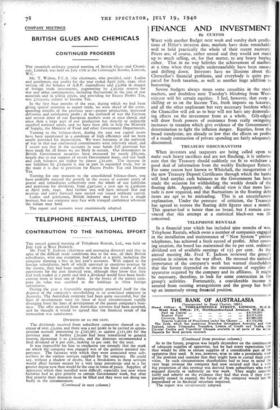TELEPHONE RENTALS, LIMITED
CONTRIBUTION TO THE NATIONAL EFFORT
Tits annual general meeting of Telephone Rentals, Ltd., was held on July 15th at West Dulwich. Mr. Fred T. Jackson (chairman and managing director) said that in spite of the difficult trade conditions due to the war, all their British subsidiaries, with one exception, had traded at a profit, including the company showing a loss in last year's accounts. With regard to the foreign subsidiaries, both of which operated in countries overrun by the enemy, they had been unable to obtain the final results of their operations for the past financial year, although they knew that they had both traded at a profit and that a dividend would have been forth- coming from at least one of them. In the books of the parent com- pany no value was ascribed to the holdings in these foreign subsidiaries.
During the year a favourable opportunity presented itself for the disposal of the company's shareholding in an associated company in Australia. The Australian company had been quite successful, but the lines of development were by force of local circumstances rapidly diverging from the lines of development of the parent company's busi- ness. The offer received from Australian interests had been accepted, and he thought it would be agreed that the financial result of the transaction was satisfactory.
DIVIDEND OF IO PER CENT.
The dividends received from subsidiary companies showed an in- crease of mei £5,00o, and there was a net profit to be carried to appro- priation account amounting to £127,367, as against £121,561 for the previous year. A further £3o,000 had been transferred to general reserve, increasing it to £200,000, and the directors recommended a final dividend of 6 per cent., making to per cent. for the year. It was impossible for him to emphasise too strongly that the work on which the company was engaged was of the greatest national im- portance. The factories with which they were associated were sub- scribers to the various services supplied by the company. He could say, without a shadow of doubt, that a breakdown in these services would affect factory output by a very large percentage and to a far greater degree now than would be the case in times of peace. Supplies of apparatus which they installed were difficult, especially just now when factories had to give priority to certain Government work, but after that priority their demands must be filled and they were not doing too badly in the circumstances.
(Continued in next column.) (Continued from previous column.)
As to the future, progress was largely dependent on the continuance of adequate supplies of apparatus, but he had every expectation that they would be able to ensure supplies of a considerable part of the apparatus they used. It was, however, wise to take a pessimistic view of the position and consider that they might have to curtail their acti- vities. In such circumstances shareholders had to bear in mind the very large revenue the company had now secured and that a very big proportion of this revenue was derived from subscribers who were engaged directly or indirectly on war work. They might consider justly and soberly on the evidence they had that even if they tem- porarily ceased to expand, the future of the company would not be jeopardised or its financial structure impaired.
The report was unanimously adopted.


































 Previous page
Previous page